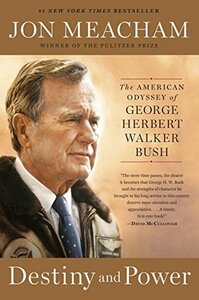Take a photo of a barcode or cover
informative
reflective
medium-paced
Listening to this book while the 2016 party conventions gave me a far better understanding of how different politics are today than they have been even 30 years ago. The sections on the 1980 and 1988 primaries and conventions was particularly interesting. Although I disagree with Pres. Bush's underlying ideology (smaller government, etc.), he was willing to compromise in order to get things accomplished and even when it was going to harm his popularity (no new taxes). Meacham had access to all of the key players and the President and First Lady's diaries.
One of the most enjoyable books I have read in recent years. George Bush Sr is/was a thoroughly decent man and Jon Meecham is a thoroughly decent author. You could sense the respect that the author had for the subject while not worrying about his objectivity.
While George Bush Sr occasionally had the same failings as other politicians he more than many others learned from his mistakes and was willing to "do the right thing" even when it wasn't in his political interests (I.e. agreeing to raise taxes after his pledge not to do so). What the ideologues forget (or do not have the intellectual capacity to understand) is that his ONLY reason for doing this was the national interest. The man committed political suicide and all the conservatives can STILL do is demonize this lion of the Oval Office.
Time and time again Meecham demonstrates the extent to which Bush was a gentleman, a consummate professional and the epitome of what it USED to take to be a successful leader in DC.
There was a passage in the book regarding the state of world affairs at the end of the first Gulf War that said that Bush had essentially accomplished his life's work: he stood at the apex of a new world order where the US was the most powerful nation but would world with international organizations, the UN, and build coalitions to ensure that aggressors would have to success when confronted by a United world.
One wonders what he really thought as he watched his son tear down all the good will that he helped build and that the 9/11 attacks solidified, and was all but gone due to the hubris of the son that he continues to love like all fathers.
While George Bush Sr occasionally had the same failings as other politicians he more than many others learned from his mistakes and was willing to "do the right thing" even when it wasn't in his political interests (I.e. agreeing to raise taxes after his pledge not to do so). What the ideologues forget (or do not have the intellectual capacity to understand) is that his ONLY reason for doing this was the national interest. The man committed political suicide and all the conservatives can STILL do is demonize this lion of the Oval Office.
Time and time again Meecham demonstrates the extent to which Bush was a gentleman, a consummate professional and the epitome of what it USED to take to be a successful leader in DC.
There was a passage in the book regarding the state of world affairs at the end of the first Gulf War that said that Bush had essentially accomplished his life's work: he stood at the apex of a new world order where the US was the most powerful nation but would world with international organizations, the UN, and build coalitions to ensure that aggressors would have to success when confronted by a United world.
One wonders what he really thought as he watched his son tear down all the good will that he helped build and that the 9/11 attacks solidified, and was all but gone due to the hubris of the son that he continues to love like all fathers.
Regardless of a person’s specific policy l leanings, Ad the author stated, George H Bush was an important figure in American politics for almost 70 years. I thought this was a very well written glimpse into a very interesting, complex, and heroic man. He made friends with both sides of the aisle, made decisions based on integrity and honor and his love for his country. I really enjoyed learning more about him and the author took the time to provide the most complete picture of the 41st president.
a solid biography but very fawning. did he have no bad habits at all? it sure didn't seem like it.
informative
inspiring
reflective
medium-paced
What a great biography. George HW must be one of the most underrated presidents. I learned a lot.
A remarkably well researched biography offered an intriguing insight into the life and career of one of the least explored presidents of the 20th century, a man who lived an extraordinarily active life. Having said that, I grew disappointed throughout the book, and particularly in the section covering Bush's presidency. Meacham's portrait of GHWB, while deeply researched, was highly sympathetic, and focused on his impression of Bush's moral character, at the expense of a full analysis of his political career. This book skipped quickly over numerous interesting historical phenomenons, including Iran/Contra, Bush's Congressional career, his 1988 campaign, and his relationship with Ross Perot, as well as other relevant episodes in Bush's life. In addition, I felt that this work would have benefited from further contextualization of the socio-political scenes that Bush encountered or engaged with throughout his life. Specifically, Bush's conflicted relationship with the Civil Rights Act, the nature of his role in the diplomatic relationship with China, particularly in the late 60's and early 70's, and his policy role in the Reagan administration would have made the book more interesting. Meacham touches on all of these things, but in each instance, seems to find one particular (positive) narrative, and then rolls on to the next moment in time.
Meacham, whom I consider to be a highly competent author and biographer, offers in this tome an impressive one volume biography of GHWB, and in doing so, (I'm speculating) probably begins the wave of fresh looks into an often overlooked presidency. He should be applauded for it. Having said all that, it can be fairly be said that his evaluation is overly warm and unbalanced, and the piece suffers as a result.
Meacham, whom I consider to be a highly competent author and biographer, offers in this tome an impressive one volume biography of GHWB, and in doing so, (I'm speculating) probably begins the wave of fresh looks into an often overlooked presidency. He should be applauded for it. Having said all that, it can be fairly be said that his evaluation is overly warm and unbalanced, and the piece suffers as a result.
I have become a bit more selective on giving a rating of 5 stars to books. This book by Jon Meacham is very deserving of that rating. It is extremely well written, and very easy to read. George Herbert Walker Bush is an underappreciated POTUS. A return to his type of values would be appreciated. To quote Mr. Meacham, "[George Bush] spent his life presenting a face of grace and generosity to the world, and that face was real". As President Barack Obama stated, "From a decorated Navy pilot who nearly gave his life in World War II to U.S. ambassador to the United Nations, from CIA director to U.S. envoy to China to the vice presidency, his life is a testament that public service is a noble calling. As President, he expanded America's promise to new immigrants and people with disabilities". I highly recommend this book.
Love Meachum's examination of a good and decent man.


